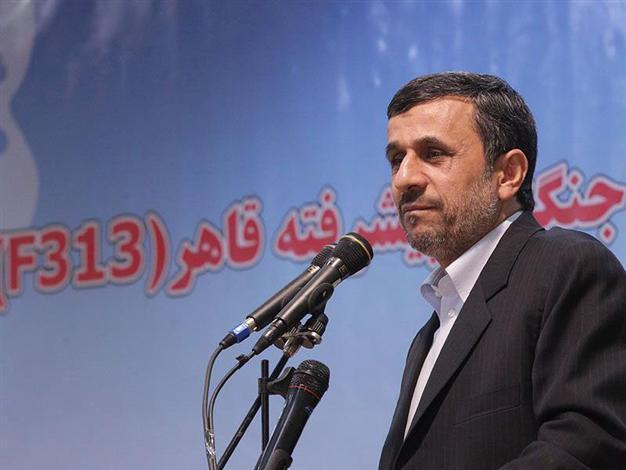Syria tops talks as Ahmadinejad in historic Egypt visit
CAIRO- Agence France-Presse

Iranian President Mahmoud Ahmadinejad in Tehran, Iran on February 2, 2013. Photo by Parspix/ABACAPRESS.COM
Mahmoud Ahmadinejad held talks in Cairo Tuesday with his Egyptian counterpart Mohamed Morsi on the divisive issue of Syria's war, as he kicked off the first visit to Egypt by an Iranian president since 1979.
Immediately on being welcomed by President Morsi at Cairo airport, the two leaders held discussions on regional developments and on "how to end the bloodshed in Syria ... without military intervention," MENA news agency said.
Egypt and Iran stand on opposite sides regarding the conflict that has ravaged Syria for almost two years, leaving more than 60,000 people dead according to the United Nations.
Tehran is committed to the survival of Syrian President Bashar al-Assad and his regime. It has supplied financial aid and admitted to sending Revolutionary Guards military advisers to Damascus.
Egypt's Morsi, though, has sided with Syria's rebels, whom he sees as upholding the revolutionary ideals that brought him and his Muslim Brotherhood to power as part of the Arab Spring.
Ahmadinejad alluded to their differences before leaving Tehran for Cairo earlier Tuesday.
"If Tehran and Cairo see more eye to eye on regional and international matters, many (issues) will change," he told reporters, according to Iran's official IRNA news agency.
During their talks, Ahmadinejad and Morsi also discussed "ways to boost relations between Egypt and Iran," said MENA, Egypt's state-run news agency.
Ahmadinejad had earlier indicated that strengthening bilateral ties with Cairo would be a main aim of his visit.
"I will try to pave the ground for developing cooperation between Iran and Egypt," Ahmadinejad was quoted as saying by IRNA.
Without elaborating, he said the visit would "definitely influence the bilateral ties" between Tehran and Cairo.
Tehran severed relations with Cairo in 1980 in protest at a peace agreement between Egypt and Israel by then Egyptian president Anwar Sadat.
Egypt has responded cautiously to Iranian efforts to revive ties since Morsi took power in 2012, due to their differences over Syria.
Ahmadinejad, president of country with the world's largest Shiite population, was later to visit the prestigious Al-Azhar institute of Sunni Islam, sources in Al-Azhar said.
The Iranian president will during his three-day stay also attend an Organisation of Islamic Cooperation conference in Cairo and hold talks with Egyptian officials, Iranian media said ahead of his trip.
Iran says will attend nuclear talks on Feb 26
TEHRAN - Agence France-Presse
Iran will attend
fresh negotiations with world powers in Kazakhstan on February 26 over
Tehran's disputed nuclear activities, its top negotiator Saeed Jalili
said in a statement released on Tuesday.
The decision was made in
a phone conversation earlier Tuesday between the offices of Jalili and
European Union foreign policy chief Catherine Ashton, Iran's official
IRNA news agency reported citing the statement.
Ashton represents the so-called P5+1 group of the United States, Russia, China, Britain and France plus Germany.
The statement did not specify which Kazakh city would host the talks.
On Sunday, Iran's Foreign Minister Ali Akbar Salehi had said that the talks were to be held on February 25.
The nuclear talks were expected to resume in December but uncertainty over the venue has been blamed for the delay.
Iran and the P5+1 held three rounds of talks last year, the last of which ended in a stalemate in June in Moscow.
The
West suspects Iran of attempting to develop a bomb under the guise of a
civilian atomic programme, but Tehran denies, insisting that its
nuclear activities are purely peaceful.
The talks aim to address a
key Western concern about Iran's capacity to enrich uranium to fissile
purities of 20 percent, a process that can be used for peaceful atomic
purposes as well as for making the core of a nuclear bomb.
Iran
has been slapped by multiple sets of United Nations Security Council
sanctions for its refusal to stop uranium enrichment. The United States
and the European Union have also imposed additional sanctions on Iran.
Iran
says it has no intention of giving up what it calls are its nuclear
"right." Tehran is also locked in a showdown with the UN's atomic
watchdog agency, which hopes to gain broader access to Iranian nuclear
facilities in a bid to find a way forward to resolve outstanding issues
of the Islamic republic's past atomic activities.
